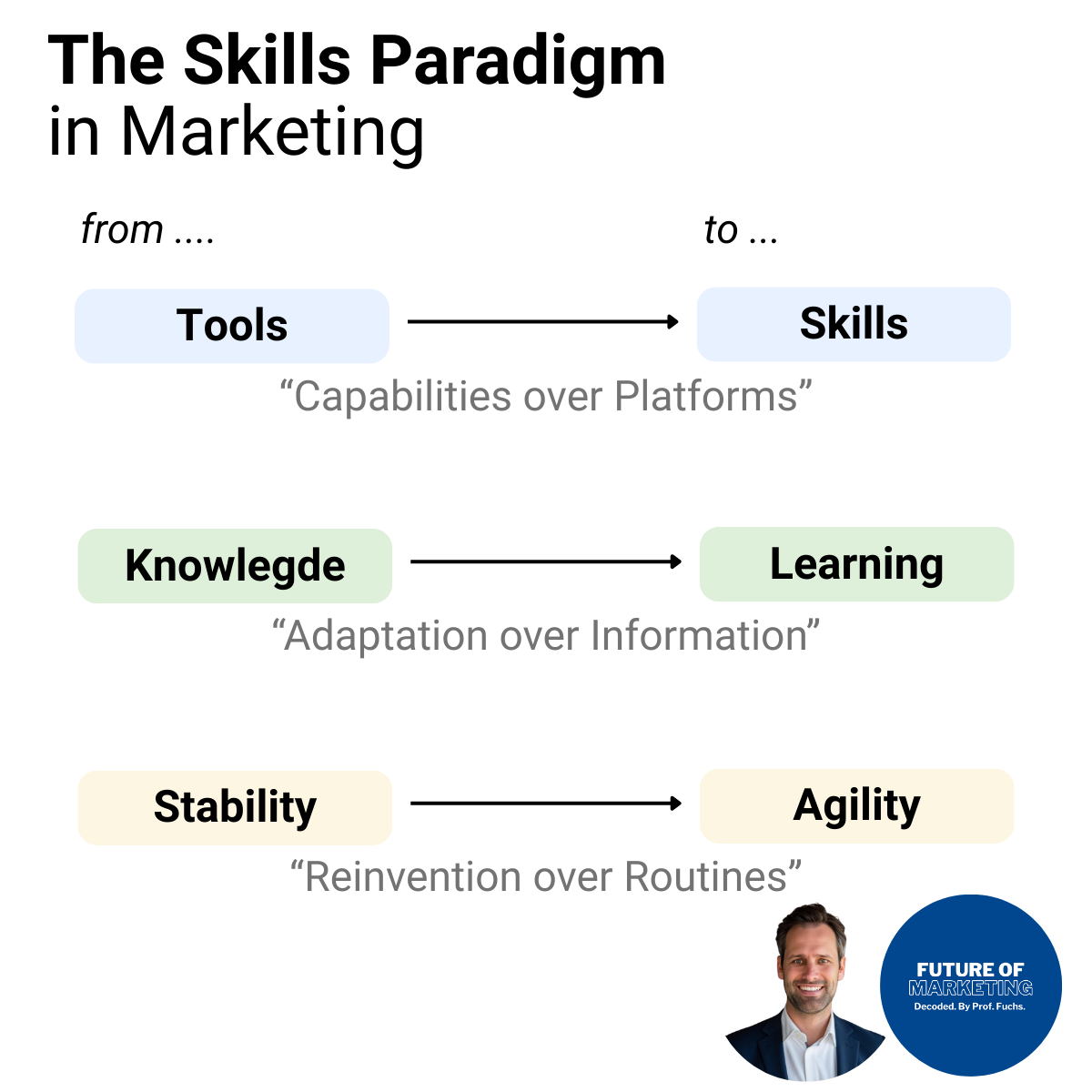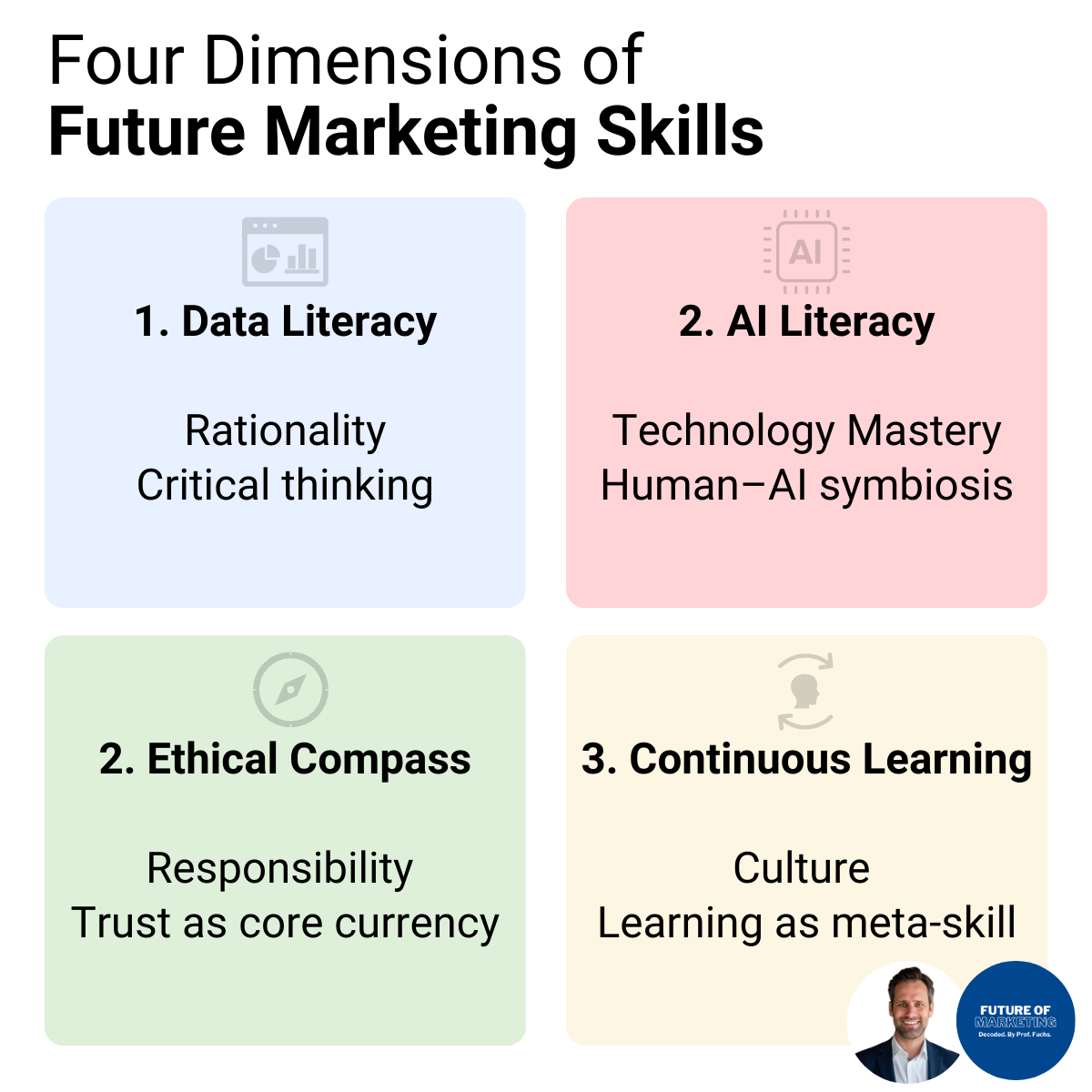Learn or Lose: The New Skills in Marketing
The half-life of knowledge is shrinking. The true transformation in marketing is not a change of tools, but a cultural rupture: how we learn determines our future.
Introduction – The Real Revolution
When we talk about the Future of Marketing, most people immediately think of new technologies: artificial intelligence, automation, data platforms … and most of all: tools. But the real revolution is taking place elsewhere – within us.
Marketing is not only being reinvented by machines, but by the people who use them. The true race of our time is about the ability to learn new things – and unlearn old ones. Those who remain static will quickly find themselves irrelevant.
Why Knowledge Becomes a Commodity
Knowledge used to be a decisive competitive advantage. Those who mastered a channel better than others or understood a method more deeply could secure long-term differentiation. But that logic has collapsed.
Algorithms generate in seconds what used to take days.
Tutorials and online courses explain every tool instantly.
Communities and platforms make expertise accessible everywhere.
“What is scarce is not knowledge, but the ability to turn knowledge into competence.”
That is why the real transformation of marketing is not technological, but cultural: from a knowledge economy to a learning economy.
The Skills Paradigm
This marks a profound paradigm shift:
From tools to skills. Not the platform defines you, but your mindset.
From knowledge to learning. Not what I know, but how fast I can adapt.
From stability to agility. Not clinging to routines, but the ability to unlearn and reinvent.
The skills debate is not a matter for HR departments. It is the survival question of marketing as a discipline.
Four Dimensions of Future Competence
Data Literacy = Rationality
Marketing has always been about storytelling and creativity. But today, the ability to work with data is just as crucial.
Data literacy does not mean every marketer must become a data scientist. It means being able to:
Read and interpret KPIs with context.
Evaluate the quality of data sources (bias, representativeness, transparency).
Translate insights into decisions that create value.
AI Literacy = Mastery of Technology
Artificial intelligence has entered marketing at breathtaking speed: content generation, audience segmentation, campaign optimization. Yet the real competitive advantage lies not in the tools themselves, but in how intelligently we use them.
AI literacy means:
Formulating precise prompts that guide AI output.
Evaluating results critically – distinguishing between insight and illusion.
Designing workflows where humans and machines complement each other.
Ethical Compass = Responsibility
As more decisions are delegated to algorithms, the ethical responsibility of marketers grows.
What if a targeting algorithm excludes people based on gender or ethnicity?
Where do we draw the line between personalization and intrusion?
How do we deal with deepfakes or AI-generated misinformation?
The trust of consumers is the most fragile currency in marketing. A single unethical decision can destroy what took years to build. An ethical compass is therefore not optional. It is the core of long-term competitiveness.
Continuous Learning = Culture
The most important skill is not a technical one – it is the meta-skill of learning itself.
The half-life of knowledge has dropped below three years. Entire job profiles are being reinvented. Continuous learning is therefore not a nice-to-have, but the foundation of every career.
In practice, this means:
Curiosity: Proactively exploring new methods, not waiting for training.
Experimentation: Testing tools and approaches in small, low-risk pilots.
Reflection: Asking not only “what worked?”, but “what did I learn?”.
For organizations, continuous learning means becoming a learning system. Firms that fail to build such a culture will lose talent and relevance. Those that succeed will attract the brightest minds – not because they have the best salaries, but because they offer the best opportunities to grow.
The Cultural Rupture
The deeper challenge lies in culture. Marketing was trained for stability for decades: annual campaign cycles, fixed role profiles, predictable markets.
But the world has changed. Permanence is gone. Marketing must reinvent itself continuously – a permanent metamorphosis.
This also means careers will no longer be linear. The marketer of tomorrow might rotate between creative, analytical and technological roles. A static job description will soon feel like a relic from the past.
For individuals, this is both unsettling and liberating. The unsettling part: no one can lean back and rely on their current expertise. The liberating part: anyone can reinvent themselves – at any stage.
Conclusion – Learn or Lose
The future of marketing is not about the next hype or the latest tool. It is about a deeper cultural shift: the move from knowledge to learning.
The decisive question is not: “What do I know?”
The decisive question is: “How fast can I learn, adapt and unlearn?”
👉 Which of these shifts — capabilities, adaptation, or reinvention — feels most urgent in your world right now?
👉 Learn or lose – that is the true imperative of marketing’s future. If you want to learn more about the future of marketing, please hit the subscribe button below.



